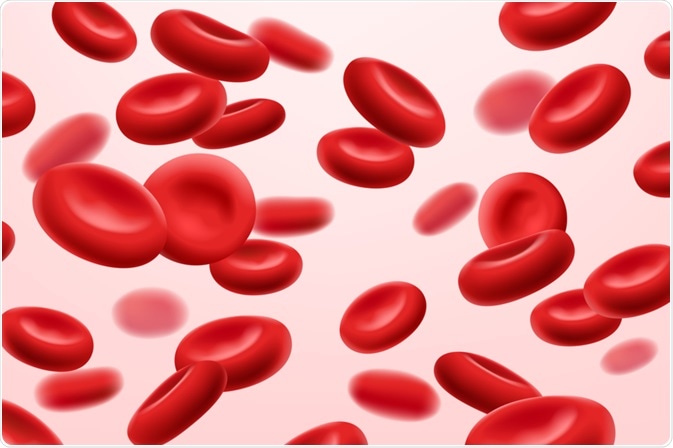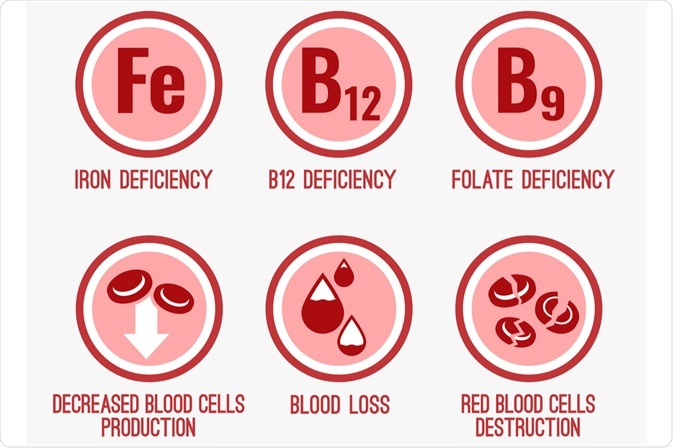Anemia is a blood disorder characterized by an inadequate level of hemoglobin in the blood.

Image Credit: MarySan / Shutterstock.com
Hemoglobin is needed to transport oxygen around the body. Moreover, hemoglobin is a protein that enables red blood cells (RBCs) to carry oxygen from the lungs to tissues and other organs in the body and also facilitates the transportation of carbon dioxide to the lungs from other parts of the body so that it can be expelled.
Mechanisms of anemia
There are several types of anemia; whereas some only cause mild health problems, others are much more serious. Whichever type of anemia a person has, the condition is caused by one of the following:
- The body fails to produce adequate levels of hemoglobin
- Hemoglobin is produced but fails to function properly
- The body does not produce adequate levels of RBCs
- RBCs are broken down too quickly in the body
Iron-deficiency anemia
Hemoglobin and RBCs are made by the bone marrow, which requires iron for their production. If there is an inadequate amount of iron available, the bone marrow cannot make hemoglobin for RBCs.
Thus, the most common cause of anemia is low iron. Some of the reasons why iron levels might be reduced include blood loss, a diet lacking in iron, and pregnancy.
Blood loss
When a person loses blood as a result of surgery, injury, or a blood clotting disorder, such as hemophilia or intestinal bleeding caused by an ulcer or cancer, anemia may develop. The use of blood thinners such as aspirin or heparin can also lead to anemia.
Aspirin and other nonsteroidal anti-inflammatory drugs (NSAIDs) can also lead to stomach ulcers and chronic intestinal bleeding. For women, menstruation is another risk factor for blood loss.
A diet lacking in iron
For the body to produce adequate levels of hemoglobin, the diet needs to be rich in iron. Some good sources of dietary iron include whole wheat bread, kidney beans, tofu, tuna, eggs, shrimps, turkey, brown rice, and lamb.
Pregnancy
An unborn baby is reliant on the mother for iron; therefore, the level of iron the body needs to increase during pregnancy to accommodate for this demand. As a result, many pregnant women will take a vitamin supplement that contains iron to decrease their risk of developing anemia.
Explaining Anemia
Vitamin deficiency Anemia
Aside from iron, the body also requires vitamin B12 and folate to produce RBCs and hemoglobin. A diet low in these nutrients can decrease the body’s ability to produce healthy RBCs that have a sufficient amount of hemoglobin. In the majority of cases, people with vitamin B12 or folate deficiency have RBCs that are large, underdeveloped, and fail to function properly. This is also referred to as megaloblastic anemia.
Foods that are a good source of B12 include meat, fish, and dairy products; therefore, a diet that includes these food products can typically ensure adequate B12 levels. People with a poor overall diet or those following a vegan diet may be at risk of vitamin B12 deficiency anemia.
Examples of foods that are good sources of folate are broccoli, asparagus, chickpeas, and brown rice. A folate deficiency may develop if these foods are not eaten regularly.
Pernicious anemia
Some individuals who consume adequate levels of B12 are still unable to process the vitamin due to an autoimmune condition called pernicious anemia.
In this condition, the body’s immune system attacks cells in the stomach that produce a protein called intrinsic factor. Intrinsic factor combines with vitamin B12 to form a complex that is then absorbed by the gut.
The lack of intrinsic factor in pernicious anemia prevents this absorption of vitamin B12. Pernicious anemia is the most common cause of vitamin B12 deficiency in the United Kingdom.
Gastrointestinal issues and anemia
Certain stomach and bowel conditions, such as Crohn's disease, or gastrointestinal surgeries, such as gastrectomy, can affect the body’s ability to absorb sufficient amounts of vitamin B12. Anemia caused by Crohn's disease or other chronic conditions such as kidney disease or cancer is referred to as anemia of chronic disease.
Medications and anemia
Some medications can affect the absorption of B12. Proton pump inhibitors (PPIs), for example, inhibit the production of acid in the stomach. Without this acid, vitamin B12 cannot be released from food in the stomach.

Image Credit: Double Brain / Shutterstock.com
Other causes of folate deficiency anemia
Malabsorption
Certain health conditions can affect the body’s ability to absorb folate properly. An example of such a condition is celiac disease.
Excessive urination
Excessive urination can lead to too much folate being expelled from the body. Examples of problems that can lead to excessive urination include acute liver damage and congestive heart failure.
Medication
Certain medications decrease folate levels or affect the body’s ability to absorb it. For example, certain types of anticonvulsants used to treat epilepsy can cause this effect.
Need for excess folate
In some circumstances, the body requires more folate than it usually would, which can lead to folate deficiency anemia if this excess need is not met. Examples of these conditions include pregnancy, certain blood disorders, cancer, as well as diseases that cause inflammation.
Aplastic anemia
Aplastic anemia is a condition that decreases the amount of RBCs because the bone marrow has become damaged and is thus incapable of making adequate amounts of new RBCs. This type of anemia be caused by a viral infection, the use of certain medications such as cancer drugs or antibiotics, and exposure to certain toxic substances. Leukemia and autoimmune diseases also affect the bone marrow’s ability to make red blood cells.
Hemolytic anemia
Hemolytic anemia is a condition where RBCs do not last as long as they usually would, which is about 120 days. The bone marrow does not produce enough RBCs at a fast enough rate to replace the ones being destroyed.
Factors that can lead to RBC destruction include autoimmune disorders, genetic conditions such as sickle cell anemia and thalassemia, glucose-6-phosphate dehydrogenase (G6PD) deficiency, blood clots, infection, and exposure to certain medications, chemicals, or toxins.
References
Further Reading
Last Updated: May 11, 2021